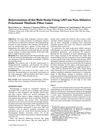 15 citations,
January 2017 in “Lasers in Surgery and Medicine”
15 citations,
January 2017 in “Lasers in Surgery and Medicine” Laser treatment improved scalp skin condition with no side effects.
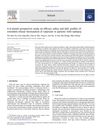 13 citations,
October 2010 in “Seizure”
13 citations,
October 2010 in “Seizure” Extended-release valproate effectively reduced seizures and improved quality of life in epilepsy patients over 6 months, with some side effects.
 12 citations,
September 2018 in “Dermatologic Therapy”
12 citations,
September 2018 in “Dermatologic Therapy” Daily low-dose aspirin lowers minoxidil's effectiveness for hair loss treatment.
 12 citations,
May 2017 in “Journal of Dermatological Treatment”
12 citations,
May 2017 in “Journal of Dermatological Treatment” Adult acne severity is influenced by stress, skin sensitivity, makeup, stopping oral contraceptives, and requires female-specific treatment guidelines.
 11 citations,
January 1987 in “Dermatology”
11 citations,
January 1987 in “Dermatology” Minoxidil works for 56% of balding men with specific criteria.
 10 citations,
July 2014 in “Veterinary dermatology”
10 citations,
July 2014 in “Veterinary dermatology” Deslorelin may help intact male dogs regrow hair from alopecia X, with a 75% success rate and no side effects.
 9 citations,
May 2021 in “International Journal of Dermatology”
9 citations,
May 2021 in “International Journal of Dermatology” The trial showed that a new under-the-tongue treatment for severe hair loss was somewhat effective in a small group of people.
 9 citations,
April 2016 in “Australasian journal of dermatology”
9 citations,
April 2016 in “Australasian journal of dermatology” Combining imiquimod with diphenylcyclopropenone may improve treatment outcomes for alopecia areata patients who don't respond to diphenylcyclopropenone alone.
 9 citations,
August 2019 in “Journal of The European Academy of Dermatology and Venereology”
9 citations,
August 2019 in “Journal of The European Academy of Dermatology and Venereology” Minoxidil activation by hair enzymes predicts treatment success for female hair loss.
 8 citations,
October 2018 in “Dermatologic Therapy”
8 citations,
October 2018 in “Dermatologic Therapy” About 41% of Indian hair loss patients have low enzyme activity that affects hair loss treatment effectiveness, with men affected more than women. Testing for this can guide treatment.
 7 citations,
August 2017 in “European Journal of Obstetrics & Gynecology and Reproductive Biology”
7 citations,
August 2017 in “European Journal of Obstetrics & Gynecology and Reproductive Biology” Lower vaspin levels in the blood may indicate a better response to fertility treatment in women with PCOS.
 6 citations,
December 1997 in “Journal of The American Academy of Dermatology”
6 citations,
December 1997 in “Journal of The American Academy of Dermatology” CTE can distort results in hair growth trials, so exclude it carefully.
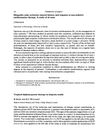 5 citations,
July 1988 in “British journal of dermatology/British journal of dermatology, Supplement”
5 citations,
July 1988 in “British journal of dermatology/British journal of dermatology, Supplement” Diphencyprone therapy can effectively treat severe hair loss in motivated patients.
 4 citations,
May 2020 in “PLOS ONE”
4 citations,
May 2020 in “PLOS ONE” Ingenol mebutate gel changes gene expression related to skin development and immune response in actinic keratosis.
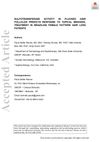 4 citations,
December 2019 in “Dermatologic Therapy”
4 citations,
December 2019 in “Dermatologic Therapy” Hair enzyme activity predicts minoxidil success in Brazilian women with hair loss.
 4 citations,
February 2011 in “Nature Reviews Endocrinology”
4 citations,
February 2011 in “Nature Reviews Endocrinology” Metformin and thiazolidinediones are similarly effective for PCOS, but metformin is often preferred due to fewer side effects.
 3 citations,
May 2020 in “Journal of The European Academy of Dermatology and Venereology”
3 citations,
May 2020 in “Journal of The European Academy of Dermatology and Venereology” Topical booster improves hair loss treatment effectiveness.
 3 citations,
April 2020 in “British Journal of Dermatology”
3 citations,
April 2020 in “British Journal of Dermatology” PRP treatment helps 70.1% of hair loss patients after two sessions.
 3 citations,
February 2020 in “Dermatologic Therapy”
3 citations,
February 2020 in “Dermatologic Therapy” Reducing micro-inflammation didn't change hair growth patterns in AGA.
 3 citations,
September 2018 in “Dermatologic Surgery”
3 citations,
September 2018 in “Dermatologic Surgery” Platelet-Rich Plasma (PRP) can improve hair loss in cicatricial alopecia cases, but treatment must be ongoing and results vary among patients.
 3 citations,
April 2016 in “Food Science and Biotechnology”
3 citations,
April 2016 in “Food Science and Biotechnology” Oriental melon leaf extract may help hair grow and keep it in the growing phase longer.
 2 citations,
February 2015 in “Journal of Tissue Engineering and Regenerative Medicine”
2 citations,
February 2015 in “Journal of Tissue Engineering and Regenerative Medicine” Transplanting a mix of specific skin cells can significantly improve the repair of damaged hair follicles.
 1 citations,
March 2017 in “Journal of evolution of medical and dental sciences”
1 citations,
March 2017 in “Journal of evolution of medical and dental sciences” Microneedling with either platelet-rich plasma or 5% minoxidil can increase hair growth in people with androgenetic alopecia, but minoxidil might be slightly better.
 1 citations,
January 2002 in “European Urology Supplements”
1 citations,
January 2002 in “European Urology Supplements” Tamsulosin works faster, but both drugs have similar effects after 6 months.
 March 2024 in “Journal of drugs in dermatology”
March 2024 in “Journal of drugs in dermatology” HASHA is a safe and effective option for chin augmentation.
 April 2016 in “Journal of The American Academy of Dermatology”
April 2016 in “Journal of The American Academy of Dermatology” Different treatments are effective for hair loss conditions, but results vary by individual factors.
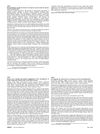 April 2016 in “Journal of The American Academy of Dermatology”
April 2016 in “Journal of The American Academy of Dermatology” Certain scalp tissue features can predict how well alopecia areata responds to steroid injections.
 April 2016 in “Journal of The American Academy of Dermatology”
April 2016 in “Journal of The American Academy of Dermatology” A vitamin and mineral supplement significantly reduced hair shedding in Brazilian women with telogen effluvium.
 August 2024 in “JAMA Dermatology”
August 2024 in “JAMA Dermatology” Continuous baricitinib is needed to keep hair regrowth in severe alopecia areata.
 January 2018 in “International journal of food and nutrition research”
January 2018 in “International journal of food and nutrition research” Intermittent iron and nutritional supplements can help reduce hair loss.






























